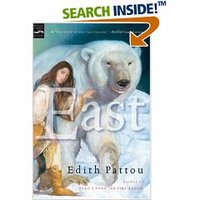
Where do I start? 446 pages of the most negative text I have ever read—including the YA novels I am so fond of!!
But I don’t want to start with the bad. I am positive that my negative is purely personal, and that the positive and amazing qualities of the text far outweigh anything I have to say.
The language was amazing. Lyrical, thick, metaphorically charged. I haven’t read anything like it before—maybe weetzie bat comes close, but that was a blink of a text while this one took endless amounts of mulling over, thinking, processing, soaking up the words—time…
Fitch must have taken an eternity to come up with such a wide array of metaphors, similes and poetry. Not a page goes by without one it seems. It distracted me initially, but then as I got deeper entrenched, it was as if the language became mine as I was immersed in it…only to be forced back into reality when I had to put it down (life, it gets in the way sometimes).
I read for several reasons. Sometimes pleasure reading is the motive—and I can pick up Harry Potter and lose myself for a while. Sometimes I need more information—research on essay revision to help students with their writing, textbooks, my journals—the English Journal/ALAN, etc. Sometimes I read to keep myself engaged with young adults today—I hope that by my wide-array of knowledge of YA texts, I can help reluctant readers find some text they could enjoy. Sometimes I read off a suggestion—White Oleander was just that—Ms. Nelson has her AP students read it (as an option), and I wanted to read what they have to read, so I did. All through my reading, if a student who had Ms. Nelson last year saw me reading it, or saw it on her shelves would rant and rave about how awesome a book it was.
So I read.
It is a fast-paced text once you get used to the thick wordiness and endless horrific encounters the protagonist endures. If you resign yourself to the notion in no way is this text awesome because of the story, then you will be totally satisfied and amazed by this book.
If you can look past the negative portrayal of women throughout the text, you will love this book. Keep in mind, not every image of women is completely negative. But, if you were to do a character study of every single woman in the text, you'd be hard pressed to find one that you would want your sister, mother, daughter, self to be.
If you want to read a book unlike any other, one in which the author has more artful craft with her words than I have in my little toe, this is the book for you.
Really, I am glad I read this book. I feel like I have been allowed into a secret world of word-appreciation and supreme usage!
:) At least give a shot!
 Unbelievable. Written by the author of Cut, this is a series of vignettes from the perspective of a Nepalese girl who is sold at 13 and forced to work in a brothel. McCormick actually traveled to India and saw these brothels and spoke to some of the young women who were lucky to escape/be freed as she researched for this text--which makes it all the more heart-wrenching and emotional.
Unbelievable. Written by the author of Cut, this is a series of vignettes from the perspective of a Nepalese girl who is sold at 13 and forced to work in a brothel. McCormick actually traveled to India and saw these brothels and spoke to some of the young women who were lucky to escape/be freed as she researched for this text--which makes it all the more heart-wrenching and emotional. 



























